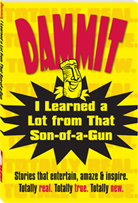
August 2014
News & Events...
Press: Click here to read the City Paper feature titled Dammit, I Learned a Lot From That Son-of-a-Gun tells local stories of hard knocks, by Dan Willis.
Now Available At...
New Retailer: Dammit Books are now available at East End Book Exchange in Pittsburgh (Bloomfield), Pennsylvania.
Become a Dammit Author...
Submit: Want to be the next Dammit author? We're now accepting submissions for the next book. Click here to submit.
Stay Informed...
Sign 'Em Up: Got a friend who might enjoy Dammit News? Forward it to them and encourage them to sign up by clicking here.Find Us At...
Brandt Street PressPO Box 8243
Pittsburgh 15217-0243
412-600-3806
brandtstreetpress.com
info@brandtstreetpress.com

Welcome back to Dammit News!
In this issue, Nicodemo Manfredo talks
about why stories matter to us.
Story: The Definitive GPS
by Nicodemo Manfredo
 |
My family was large and widely dispersed. We were lucky in that, for most of our lives, four or five generations were alive. My grandmother’s grandmother died when I was eleven. She was born in 1851, sixty years before the earthquake that caused her to flee Calabria. She was fourteen years old when the American Civil War happened. She was in her thirties when the modern automobile was invented. I spoke to her in person.
Scott Bradley Smith talks about one of
his all-time favorite stories.
Juvenile Delinquency
by Scott Bradley Smith
“In walks these three girls in nothing but bathing suits. I’m in the third check-out slot, with my back to the door, so I don’t see them until they’re over by the bread.”
So begins John Updike’s “A&P,” a classic summer story and as good a tale of teenage angst as you’ll find. It has long been one of my favorites, and not just because Updike grew up fairly close to where I did, in eastern Pennsylvania. True, Updike captures brilliantly what it means for a boy to hold down his first job, and the responsibility that comes with it. The narrator, Sammy, is also a keen observer of store culture—right down to the “cash-register watchers” (customers who scrutinize his every move) and the store manager who gives the three girls a “sad Sunday-school-superintendent stare.”
My own first real job was in a grocery store as well, and I feel a tight kinship with Sammy, as his fledgling ideas of acceptable behavior bump smack up against the propriety demanded by society:
“You know, it’s one thing to have a girl in a bathing suit down on the beach, where what with the glare nobody can look at each other much anyway, and another thing in the cool of the A&P, under the fluorescent lights, against all those stacked packages, with her feet paddling along naked over our checkerboard green-and-cream rubber-tile floor.”
When the manager chastises the girls, Sammy decides he’s obliged to intervene. What happens? You’ll have to read the story to find out. Maybe Sammy’s attitude toward power will give you a hint: “That’s policy for you. Policy is what the kingpins want. What the others want is juvenile delinquency.”
Sammy’s attitude about propriety makes me think about the art of storytelling. There are a number of proven story formulas that have served us well over the course of several thousand years. But there’s no policy, no right way and wrong way to tell a story. Tales can be wound and unwound in any number of different patterns, chronologies, points of view, voices—each of which can generate a sublime surprise. For the sake of surprise, give me some good old-fashioned juvenile delinquency anytime.
 |
What happens when someone shares a story with us—a true story, a story from their heart-of-hearts?
We feel connected. We realize the commonality of our emotions. How we are, as human beings, all the same. We all falter. We all fear. We all stumble. And we can all come back stronger.
This book contains those stories.
www.dammitbook.com